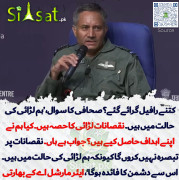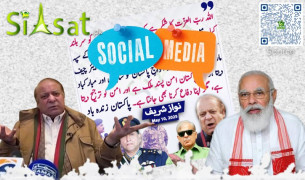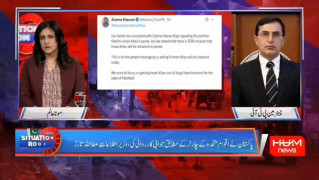NasNY
Chief Minister (5k+ posts)
[h=1]Pakistan Unexpectedly Cuts Rates Even as Rupee Drops to Record[/h] By Faseeh Mangi and Khurrum Anis
Pakistan unexpectedly cut interest rates for the first time this year to boost economic growth, even as higher taxes and a drop in the nations currency to a record low threaten to revive inflation.
The discount rate was lowered to 9 percent from 9.5 percent, the State Bank of Pakistan said in a statement in Karachi yesterday. Three of 13 analysts predicted the decision in a Bloomberg News survey. The rest saw no change for the third straight meeting.
The move contrasts with decisions to hold or raise rates in nations from India to Indonesia and Brazil, which are seeking to steady their currencies as the prospect of decreased U.S. monetary stimulus hurts emerging-market assets. Pakistan also faces challenges from an energy crisis and a plunge in foreign reserves that has increased the odds of an International Monetary Fund bailout.
It will be very tough to sustain this as inflation will rise, said Furqan Punjani, deputy head of research at BMA Capital Management Ltd. in Karachi.
The rupee has depreciated about 4.6 percent versus the dollar in the past year and touched an all-time low of 98.9675 yesterday, according to data compiled by Bloomberg. The Karachi Stock Exchange 100 index has climbed about 60 percent in the period, boosted by corporate earnings.
Consumer prices rose 5.13 percent in May from a year earlier, the slowest pace since at least 2009, according to data compiled by Bloomberg.
[h=2]Balancing Risks[/h] The central bank said it placed a higher weighting on moderating price pressures and lower private-sector credit relative to the balance-of-payments position. At the same time, it said there is a risk average inflation may exceed 8 percent next financial year.
There has been a discernible positive change in sentiments post May 2013 elections because of clarity on the political front, the monetary authority also said in its statement.
Finance Minister Ishaq Dar in his June 12 budget speech pledged to narrow the widest fiscal deficit in over two decades and to spur expansion in an economy he said was shattered.
Dar imposed additional levies, such as a sales-tax increase to 17 percent from 16 percent, to help achieve a deficit of 6.3 percent of gross domestic product in the year starting July 1.
His objectives are 4.4 percent economic growth next fiscal year, up from an estimated 3.6 percent in 2012-2013, and to keep inflation in single digits.
Foreign reserves slid 44 percent to $6.24 billion in June from a year earlier, enough to cover about two months of imports, central bank data shows.
[h=2]IMF Position[/h] The IMF wont sign a new loan program without a deep and clear commitment on a set of policy reforms to curb the budget deficit, Jeffrey Franks, head of the IMFs Pakistan mission, said in January.
An IMF team was due in the country from June 19 for a routine visit, Dar said earlier this month.
Power shortages have hurt growth. The government has said it plans to unveil an energy policy soon to tackle $5 billion of power-industry dues from unpaid bills that have choked electricity generation.
Yesterdays rate decision was the first since Prime Minister Nawaz Sharif returned to power in a May 11 general election, more than 13 years after his second period as premier was cut short by a 1999 army coup. Aside from economic woes, he also faces a Taliban insurgency in Pakistans northwest.
Pakistan unexpectedly cut interest rates for the first time this year to boost economic growth, even as higher taxes and a drop in the nations currency to a record low threaten to revive inflation.
The discount rate was lowered to 9 percent from 9.5 percent, the State Bank of Pakistan said in a statement in Karachi yesterday. Three of 13 analysts predicted the decision in a Bloomberg News survey. The rest saw no change for the third straight meeting.
The move contrasts with decisions to hold or raise rates in nations from India to Indonesia and Brazil, which are seeking to steady their currencies as the prospect of decreased U.S. monetary stimulus hurts emerging-market assets. Pakistan also faces challenges from an energy crisis and a plunge in foreign reserves that has increased the odds of an International Monetary Fund bailout.
It will be very tough to sustain this as inflation will rise, said Furqan Punjani, deputy head of research at BMA Capital Management Ltd. in Karachi.
The rupee has depreciated about 4.6 percent versus the dollar in the past year and touched an all-time low of 98.9675 yesterday, according to data compiled by Bloomberg. The Karachi Stock Exchange 100 index has climbed about 60 percent in the period, boosted by corporate earnings.
Consumer prices rose 5.13 percent in May from a year earlier, the slowest pace since at least 2009, according to data compiled by Bloomberg.
[h=2]Balancing Risks[/h] The central bank said it placed a higher weighting on moderating price pressures and lower private-sector credit relative to the balance-of-payments position. At the same time, it said there is a risk average inflation may exceed 8 percent next financial year.
There has been a discernible positive change in sentiments post May 2013 elections because of clarity on the political front, the monetary authority also said in its statement.
Finance Minister Ishaq Dar in his June 12 budget speech pledged to narrow the widest fiscal deficit in over two decades and to spur expansion in an economy he said was shattered.
Dar imposed additional levies, such as a sales-tax increase to 17 percent from 16 percent, to help achieve a deficit of 6.3 percent of gross domestic product in the year starting July 1.
His objectives are 4.4 percent economic growth next fiscal year, up from an estimated 3.6 percent in 2012-2013, and to keep inflation in single digits.
Foreign reserves slid 44 percent to $6.24 billion in June from a year earlier, enough to cover about two months of imports, central bank data shows.
[h=2]IMF Position[/h] The IMF wont sign a new loan program without a deep and clear commitment on a set of policy reforms to curb the budget deficit, Jeffrey Franks, head of the IMFs Pakistan mission, said in January.
An IMF team was due in the country from June 19 for a routine visit, Dar said earlier this month.
Power shortages have hurt growth. The government has said it plans to unveil an energy policy soon to tackle $5 billion of power-industry dues from unpaid bills that have choked electricity generation.
Yesterdays rate decision was the first since Prime Minister Nawaz Sharif returned to power in a May 11 general election, more than 13 years after his second period as premier was cut short by a 1999 army coup. Aside from economic woes, he also faces a Taliban insurgency in Pakistans northwest.





























